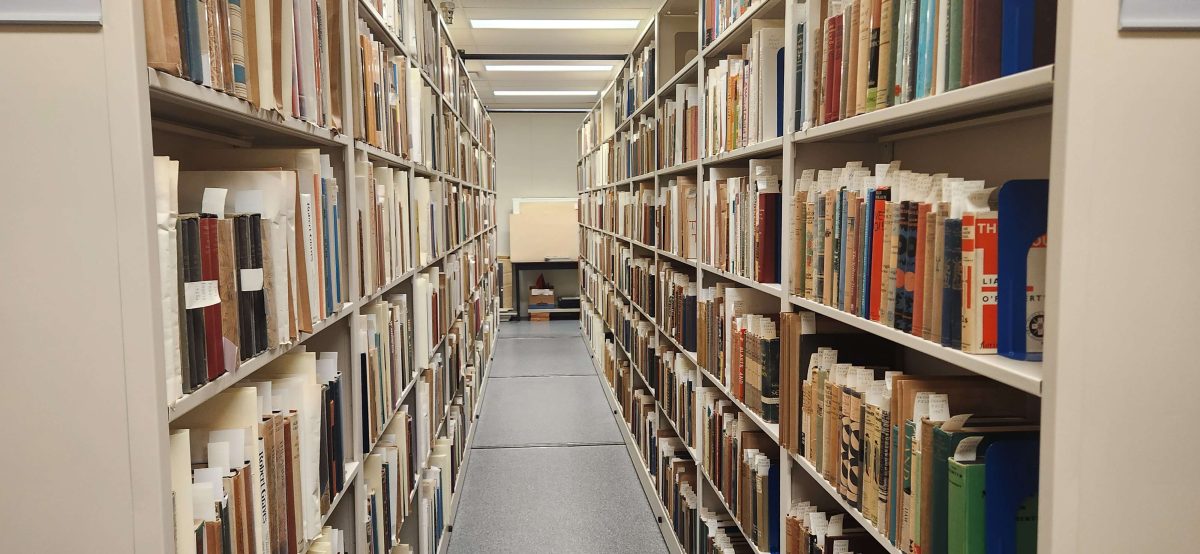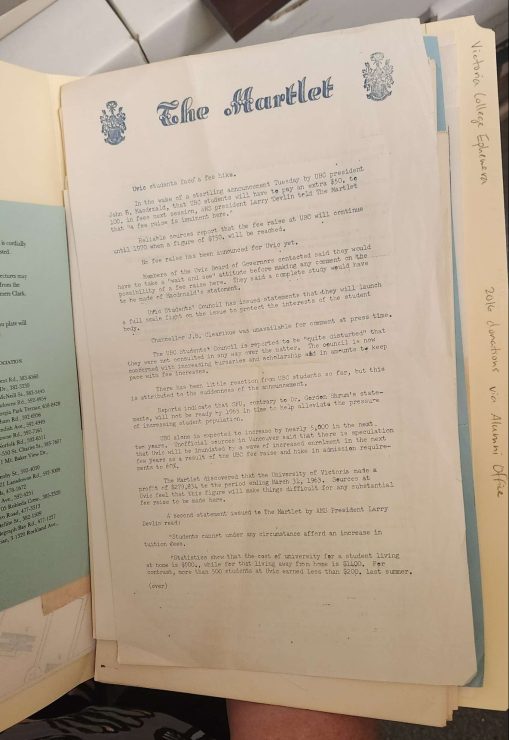What to expect from a visit to UVic’s Special Collections and University Archives

Photo by Kristen de Jager.
Down in the basement of McPherson Library, past the stairs and protected by the quiet floor, just might be UVic’s best kept (not so secret) secret, the University of Victoria’s Special Collections and University Archives.
With Special Collections originally opening in the 1960s and the addition of UVic Archives in 1973, together the UVic Special Collections and University Archives is host to many old and special objects that help further people’s understanding and research of the past.
Heather Dean, the associate director of Special Collections, explained as she showed me around the space that the original intent for the Special Collections was to have an “Anglo-Irish modernism” focus.
“That was partly because of an arrangement between UBC, and SFU, and UVic, with each university taking a different area of focus,” said Dean. “The idea was that they would be complementary.”
Dean also added that’s why the university hosts some unexpected objects, for example, certain items such as Charles Dickens’ serials, might seem like they belong at the British Library instead.
However, the university has long since departed from their exclusive collection of Anglo-Irish artifacts and are now focused on expanding their collection of local artifacts. These include, but are not limited to, the transgender archives, the history of the local women’s rights movement, arts and culture, and environmental archives.
The UVic Special Collections and University Archives also hold important documentation from the university’s academic, executive, and administrative offices. This also includes correspondence between different members of faculty, as well as any items that were deemed important — from the different versions of official UVic stamps, to UVic graduation sweaters from the 1990s.
The oldest item that the University of Victoria’s Special Collections and University Archives possesses is a Cuneiform tablet that’s about 2 000 years old.
While these items may seem like they are only available to students whose studies are linked to history or English, that is not the case. All students are encouraged to use the archives for their own research.
As Jane Morrison, the associate university archivist, explained, the University Archives have been helpful for faculty members from a variety of fields. Recently, someone used the archives to research the changes in seaweed over time.
“These amazing archives can be a wealth of information,” said Morrison.“We happen to have collected the research data from scientists back in the day, and now people realize they can use it for that purpose.”
Aside from independent research, English and history undergrad classes are sometimes taken down into the archives to discuss a particular collection or object in-person.
“The focus of the teaching here is to engage with the objects. So, like object-based learning. We tend to do little pods where students can work in pairs to really do a deep dive into some of the collection material,” said Dean. “So, thinking about not just the content, but also what’s interesting about the materiality. Like ‘What does the object tell you that maybe the text in the object doesn’t tell you?’”

Photo by Kristen de Jager.
The UVic Special Collections and University Archives are now in their second year of offering student fellowships in research. In this program, students are invited to do a creative research project using the materials in the Special Collections and University Archives.
Throughout the program students do independent research, as well as attend and host workshops surrounding the field of their creative project. The most recent participants in the program investigated topics such as the transgender archives, anarchy, Egyptian-inspired crafting in girls’ magazines, and the history of book making in Mesoamerica.
Students that are interested in participating in a fellowship like this may come from any faculty.
Whether it’s for a special program, or just a special interest, students are encouraged to come and check out this area of the library; however, keep in mind that the procedure is different from simply browsing the shelves and pulling books at leisure.
Instead, students request physical copies of books and materials that are held in the Special Collections and University Archives through their desk, and then look through the material in the reading room.
“All of our print materials are integrated in the same catalogue as the rest of the library collection,” said Dean, explaining where students can find out what rare and old items UVic has available.
However, if you feel intimidated, you do not necessarily always have to come into the space with a specific item in mind.
“We also are available [by] email, or phone, or in person to talk. If a student has a general idea of what the research is, but needs help making a connection to the collection, then we can talk through that research process with them,” said Dean.
With all of this procedure, why go to Special Collections and University Archives if students can just access something for their papers online?
“It can be a very intimate experience. It’s an opportunity to practise historical empathy for people from the past,” said Dean. “It’s your opportunity to come in and look at that original, raw material and come to your own conclusions. You’re not reading that through someone else’s presentation or interpretation. It’s your opportunity to bring a fresh set of eyes, but also a fresh perspective or a new perspective on something.”






